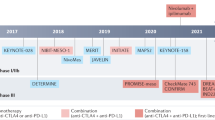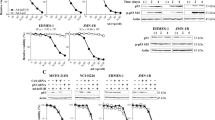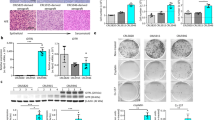Abstract
Malignant mesothelioma, developed in the thoracic cavity, is resistant to current treatments. Suppression of the local tumor growth is beneficial to the patients since mesothelioma infrequently metastasizes to extrapleural organs. A majority of the tumors have a homologous genetic deletion at the INK4A/ARF locus that includes the p14ARF and the p16INK4A genes, and the genetic defect results in an inactivation of the p53-mediated pathways and in progression of cell cycle through pRb phosphorylation. Preclinical studies targeting the genetic abnormality with adenoviruses showed that restoration of the p53 pathways induced pRb dephosphorylation and subsequently produced anti-tumor effects. A number of preclinical studies with different genes and vector systems demonstrated the therapeutic efficacy and raised the possibility of gene therapy in clinical settings. An intrapleural administration of vectors has several advantages in transducing pleural mesothelioma but activates rapid antibody production which impedes further gene expression. There have been several clinical studies conducted for mesothelioma and these trials showed the feasibility of intrapleural administrations of adenovirus vectors. In this review we summarize major preclinical and clinical gene therapy for mesothelioma, and discuss the advantages of gene therapy in the context of stimulating host immune systems. Accumulating clinical data suggest that an intrapleural administration of viral vectors has distinct aspects which are not observed in other administration routes.
This is a preview of subscription content, access via your institution
Access options
Subscribe to this journal
Receive 12 print issues and online access
$259.00 per year
only $21.58 per issue
Buy this article
- Purchase on Springer Link
- Instant access to full article PDF
Prices may be subject to local taxes which are calculated during checkout


Similar content being viewed by others
References
Carbone M, Kratzke RA, Testa JR . The pathogenesis of mesothelioma. Semin Oncol 2002; 29: 2–17.
Carbone M, Baris YI, Bertino P, Brass B, Comertpay S, Dogan AU et al. Erionite exposure in North Dakota and Turkish villages with mesothelioma. Proc Natl Acad Sci USA 2011; 108: 13618–13623.
Lin R-T, Takahashi K, Karjalainen A, Hoshuyama T, Wilson D, Kameda T et al. Ecological association between asbestos-related diseases and historical asbestos consumption: an international analysis. Lancet 2007; 369: 844–849.
Robinson BW, Musk AW, Lake RA . Malignant mesothelioma. Lancet 2005; 366: 397–408.
Vogelzang NJ, Rusthoven JJ, Symanowski J, Denham C, Kaukel E, Ruffie P et al. Phase III study of pemetrexed in combination with cisplatin versus cisplatin alone in patients with malignant pleural mesothelioma. J Clin Oncol 2003; 21: 2636–2644.
Sterman DH, Treat J, Litzky LA, Amin KM, Coonrod L, Molnar-Kimber K et al. Adenovirus-mediated herpes simplex virus thymidine kinase/ganciclovir gene therapy in patients with localized malignancy. results of a phase I clinical trial in malignant mesothelioma. Hum Gene Ther 1998; 9: 1083–1092.
Schwarzenberger P, Harrison L, Weinacker A, Marrogi A, Byrne P, Ramesh R et al. The treatment of malignant mesothelioma with a gene modified cancer cell line. A phase I study. Hum Gene Ther 1998; 9: 2641–2649.
Harrison LHJr, Schwarzenberger PO, Byrne PS, Marrogi AJ, Kolls JK, McCarthy KE et al. Gene-modified PA1-STK cells home to tumor sites in patients with malignant pleural mesothelioma. Ann Thorac Surg 2000; 70: 407–411.
Sterman DH, Recio A, Vachani A, Sun J, Cheung L, DeLong P et al. Long-term follow-up of patients with malignant pleural mesothelioma receiving high-dose adenovirus herpes simplex thymidine kinase/ganciclovir suicide gene therapy. Clin Cancer Res 2005; 11: 7444–7453.
Sterman DH, Recio A, Carroll RG, Gillespie CT, Haas A, Vachani A et al. A phase I clinical trial of single-dose intrapleural IFN-β gene transfer for malignant pleural mesothelioma and metastatic pleural effusions. high rate of antitumor immune responses. Clin Cancer Res 2007; 13: 4456–4466.
Sterman DH, Recio A, Haas A, Vachani A, Katz SI, Gillespie1 CT et al. A Phase I trial of repeated intrapleural adenoviral-mediated interferon-β gene transfer for mesothelioma and metastatic pleural effusions. Mol Ther 2010; 18: 852–860.
Sterman DH, Haas A, Moon E, Recio A, Schwed D, Vachani A et al. A trial of intrapleural adenoviral-mediated interferon-α2b gene transfer for malignant pleural mesothelioma. Am J Respir Crit Care Med 2011; 184: 1395–1399.
Lee AY, Raz DJ, He B, Jablons DM . Update on the molecular biology of malignant mesothelioma. Cancer 2007; 109: 1454–1461.
Frizelle SP, Grim J, Zhou J, Gupta P, Curiel DT, Geradts J et al. Re-expression of p16INK4a in mesothelioma cells results in cell cycle arrest, cell death, tumor suppression and tumor regression. Oncogene 1998; 16: 3087–3095.
Yang CT, You L, Yeh CC, Chang JW, Zhang F, McCormick F et al. Adenovirus-mediated p14(ARF) gene transfer in human mesothelioma cells. J Natl Cancer Inst 2000; 92: 636–641.
Hopkins-Donaldson S, Belyanskaya LL, Simoes-Wust AP, Sigrist B, Kurtz S, Zangemeister-Wittke U et al. p53-induced apoptosis occurs in the absence of p14(ARF) in malignant pleural mesothelioma. Neoplasia 2006; 8: 551–559.
Frizelle SP, Rubins JB, Zhou JX, Curiel DT, Kratzke RA . Gene therapy of established mesothelioma xenografts with recombinant p16INK4a adenovirus. Cancer Gene Ther 2000; 7: 1421–1425.
Yang CT, You L, Uematsu K, Yeh CC, McCormick F, Jablons DM . p14(ARF) modulates the cytolytic effect of ONYX-015 in mesothelioma cells with wild-type p53. Cancer Res 2001; 61: 5959–5963.
Yang CT, You L, Lin YC, Lin CL, Mccormick F, Jablons DM . A comparison analysis of anti-tumor efficacy of adenoviral gene replacement therapy (p14ARF and p16INK4A) in human mesothelioma cells. Anticancer Res 2003; 23: 33–38.
St John LS, Sauter ER, Herlyn M, Litwin S, Adler-Storthz K . Endogenous p53 gene status predicts the response of human squamous cell carcinomas to wild-type p53. Cancer Gene Ther 2000; 7: 749–756.
Giuliano M, Catalano A, Strizzi L, Vianale G, Capogrossi M, Procopio A . Adenovirus-mediated wild-type p53 overexpression reverts tumourigenicity of human mesothelioma cells. Int J Mol Med 2000; 5: 591–596.
Li Q, Kawamura K, Yamanaka M, Okamoto S, Yang S, Yamauchi S et al. Upregulated p53 expression activates apoptotic pathways in wild-type p53-bearing mesothelioma and enhances cytotoxicity of cisplatin and pemetrexed. Cancer Gene Ther 2012; 19: 218–228.
Strizzi L, Catalano A, Vianale G, Orecchia S, Casalini A, Tassi G et al. Vascular endothelial growth factor is an autocrine growth factor in human malignant mesothelioma. J Pathol 2001; 193: 468–475.
Jagadeeswaran R, Ma PC, Seiwert TY, Jagadeeswaran S, Zumba O, Nallasura V et al. Functional analysis of c-Met/hepatocyte growth factor pathway in malignant pleural mesothelioma. Cancer Res 2006; 66: 352–361.
Matsumoto K, Nakamura T . NK4 (HGF-antagonist/angiogenesis inhibitor) in cancer biology and therapeutics. Cancer Sci 2003; 94: 321–327.
Sakai K, Nakamura T, Matsumoto K, Nakamura T . Angioinhibitory action of NK4 involves impaired extracellular assembly of fibronectin mediated by perlecan-NK4 association. J Biol Chem 2009; 284: 22491–22499.
Suzuki Y, Sakai K, Ueki J, Xu Q, Nakamura T, Shimada H et al. Inhibition of Met/HGF receptor and angiogenesis by NK4 leads to suppression of tumor growth and migration in malignant pleural mesothelioma. Int J Cancer 2010; 127: 1948–1957.
Zhu ZB, Makhija SK, Lu B, Wang M, Wang S, Takayama K et al. Targeting mesothelioma using an infectivity enhanced survivin-conditionally replicative adenoviruses. J Thorac Oncol 2006; 1: 701–711.
Kubo S, Kawasaki Y, Yamaoka N, Tagawa M, Kasahara N, Terada N et al. Complete regression of human malignant mesothelioma xenografts following local injection of midkine promoter driven oncolytic adenovirus. J Gene Med 2010; 12: 681–692.
Gauvrit A, Brandler S, SapedePeroz C, Boisgerault N, Tangy F, Gregoire M . Measles virus induces oncolysis of mesothelioma cells and allows dendritic cells to crossprime tumor-specific CD8 response. Cancer Res 2008; 68: 4882–4892.
Li H, Peng KW, Dingli D, Kratzke RA, Russell SJ . Oncolytic measles viruses encoding interferon-β and the thyroidal sodium iodide symporter gene for mesothelioma virotherapy. Cancer Gene Ther 2010; 17: 550–588.
Kawasaki Y, Tamamoto A, Takagi-Kimura M, Maeyama Y, Yamaoka N, Terada N et al. Replication competent retrovirus vector mediated prodrug activator gene therapy in experimental models of human malignant mesothelioma. Cancer Gene Ther 2011; 18: 571–578.
Silberhumer GR, Brader P, Wong J, Serganova IS, Gönen M, Gonzalez SJ et al. Genetically engineered oncolytic Newcastle disease virus effectively induces sustained remission of malignant pleural mesothelioma. Mol Cancer Ther 2010; 9: 2761–2769.
Adusumilli PS, Stiles BM, Chan MK, Mullerad M, Eisenberg DP, BenPorat L et al. Imaging and therapy of malignant pleural mesothelioma using replication competent herpes simplex viruses. J Gene Med 2006; 8: 603–615.
Willmon CL, Saloura V, Fridlender ZG, Wongthida P, Diaz RM, Thompson J et al. Expression of IFN-β enhances both efficacy and safety of oncolytic vesicular stomatitis virus for therapy of mesothelioma. Cancer Res 2009; 69: 7713–7720.
Morodomi Y, Yano T, Kinoh H, Harada Y, Saito S, Kyuragi R et al. BioKnife, a uPA activity-dependent oncolytic Sendai virus, eliminates pleural spread of malignant mesothelioma via simultaneous stimulation of uPA expression. Mol Ther 2012; 20: 769–777.
Gaggar A, Shayakhmetov DM, Lieber A . CD46 is a cellular receptor for group B adenoviruses. Nat Med 2003; 9: 1408–1412.
Yu L, Takenobu H, Shimozato O, Kawamura K, Nimura Y, Seki N et al. Increased infectivity of adenovirus type 5 bearing type 11 or type 35 fibers to human esophageal and oral carcinoma cells. Oncol Rep 2005; 14: 831–835.
Kim JH, Lee YS, Kim H, Huang JH, Yoon AR, Yun CO . Relaxin expression from tumor-targeting adenoviruses and its intratumoral spread, apoptosis induction, and efficacy. J Natl Cancer Inst 2006; 98: 1482–1493.
Watanabe Y, Kojima T, Kagawa S, Uno F, Hashimoto Y, Kyo S et al. A novel translational approach for human malignant pleural mesothelioma: heparanase-assisted dual virotherapy. Oncogene 2010; 29: 1145–1154.
Gerwin BI, Lechner JF, Reddel RR, Roberts AB, Robbins KC, Gabrielson. EW et al. Comparison of production of transforming growth factor-β and platelet-derived growth factor by normal human mesothelial cells and mesothelioma cell lines. Cancer Res 1987; 47: 6180–6184.
Cerullo V, Pesonen S, Diaconu I, Escutenaire S, Arstila PT, Ugolini M et al. Oncolytic adenovirus coding for granulocyte macrophage colony-stimulating factor induces antitumoral immunity in cancer patients. Cancer Res 2010; 70: 4297–4309.
Liu DH, Liu WC, Fan L, Sheng R, Xue Y, Wang W et al. Clinical effect of p53 gene Gendicine in treatment of malignant effusions. Chin J Cancer Prev Treat 2006; 13: 1108–1109.
Molnar-Kimber KL, Sterman DH, Chang M, Kang EH, ElBash M, Lanuti M et al. Impact of preexisting and induced humoral and cellular immune responses in an adenovirus-based gene therapy phase I clinical trial for localized mesothelioma. Hum Gene Ther 1998; 9: 2121–2133.
Tagawa M, Kawamura K, Ueyama T, Nakamura M, Tada Y, Ma G et al. Cancer therapy with local oncolysis and topical cytokine secretion. Front Biosci 2008; 13: 2578–2587.
Mukherjee S, Haenel T, Himbeck R, Scott B, Ramshaw I, Lake RA et al. Replication-restricted vaccinia as a cytokine gene therapy vector in cancer. Persistent transgene expression despite antibody generation. Cancer Gene Ther 2000; 7: 663–670.
Acknowledgements
This work was partly supported by Grants-in-Aid for Scientific Research from the Ministry of Education, Culture, Sports, Science and Technology of Japan, the Grant-in-Aid for Cancer Research from the Ministry of Health, Labor and Welfare of Japan, and a Grant-in-aid from the Nichias Corporation.
Author information
Authors and Affiliations
Corresponding author
Ethics declarations
Competing interests
The authors declare no conflict of interest.
Rights and permissions
About this article
Cite this article
Tagawa, M., Tada, Y., Shimada, H. et al. Gene therapy for malignant mesothelioma: Current prospects and challenges. Cancer Gene Ther 20, 150–156 (2013). https://doi.org/10.1038/cgt.2013.1
Received:
Revised:
Accepted:
Published:
Issue Date:
DOI: https://doi.org/10.1038/cgt.2013.1
Keywords
This article is cited by
-
Effects of inhalable gene transfection as a novel gene therapy for non-small cell lung cancer and malignant pleural mesothelioma
Scientific Reports (2022)
-
An MDM2 inhibitor achieves synergistic cytotoxic effects with adenoviruses lacking E1B55kDa gene on mesothelioma with the wild-type p53 through augmenting NFI expression
Cell Death & Disease (2021)
-
Combination of a third generation bisphosphonate and replication-competent adenoviruses augments the cytotoxicity on mesothelioma
BMC Cancer (2016)
-
Impact of Different Promoters on Episomal Vectors Harbouring Characteristic Motifs of Matrix Attachment Regions
Scientific Reports (2016)



